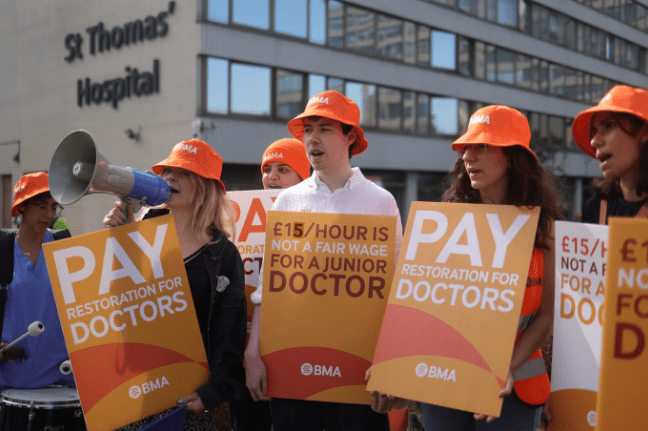Thousands of resident doctors across England have begun receiving ballots for potential strike action, as tensions escalate over the Government’s recent pay proposal.
The move follows the announcement last week of a 4% pay increase for most doctors, with resident doctors – previously referred to as junior doctors – offered an additional £750 top-up. Despite the gesture, it’s sparked frustration rather than relief.
The British Medical Association (BMA), which represents doctors, has sharply criticised the offer, branding it inadequate in the face of years of pay erosion.
The ballots began arriving on Tuesday and will remain open until 7 July. Should resident doctors vote in favour, the strike mandate would extend from July through January 2026.
Co-chairs of the BMA’s junior doctor committee, Dr Melissa Ryan and Dr Ross Nieuwoudt, delivered a scathing assessment of the Government’s approach. “Last week the Government finally told us what it would do to restore the pay of doctors: almost nothing.”
They argue that resident doctors’ salaries have plummeted by 23% in real terms since 2008. The current offer, they claim, falls dramatically short of restoring value to medical professionals who are essential to the NHS.
“The NHS does not have that time. Waiting lists are too high, too many people can’t see their GP, too many patients are being treated in corridors.”
The BMA is encouraging its members to vote “yes” in the resident doctors strike ballot, insisting this is the only way to push the Government toward a fair resolution.
Yet, the door remains open to talks. “We are urging doctors to vote yes to strike action… The answer is to fix it today. Even if doctors vote for industrial action, with the right approach, not a single picket line need ever form.”
The Department of Health has defended the offer, noting it exceeds the current inflation rate, which rose to 3.5% in April – the highest since January 2024.
Health Secretary Wes Streeting responded to the backlash by highlighting improvements already made. “I was determined to resolve the pay dispute and give resident doctors a substantial pay rise.”
According to Mr Streeting, pay for resident doctors has climbed by nearly 29% compared to three years ago, with the average starting salary now around £38,800. “Together, we have made great progress… let’s not stop now.”
In a BBC interview, Mr Streeting called on doctors to “vote no”, warning that further strikes could hinder NHS recovery efforts.
“I don’t think strikes are in their interests, in patients’ interests, and I certainly don’t think it’s in the interest of the NHS overall.”
Resident doctors, numbering more than 50,000 in England, have already taken part in 11 rounds of industrial action since 2022. Their roles span from recent graduates to medics with over a decade of experience, working in hospitals and GP practices.
NHS England estimates that these walkouts have led to nearly 1.5 million cancelled or rescheduled appointments, adding further strain to an already pressured health system.
Professor Philip Banfield, the BMA’s council chairman, issued a warning last week, stating the Government’s offer delays the restoration of doctors’ pay even further.
“Doctors’ pay is still around a quarter less than it was in real terms 16 years ago… without a government plan or reassurance to correct this erosion.”
The resident doctors strike ballot signals not just another dispute, but a broader standoff over the value placed on frontline NHS workers. The outcome may shape the future of the health service for years to come.






